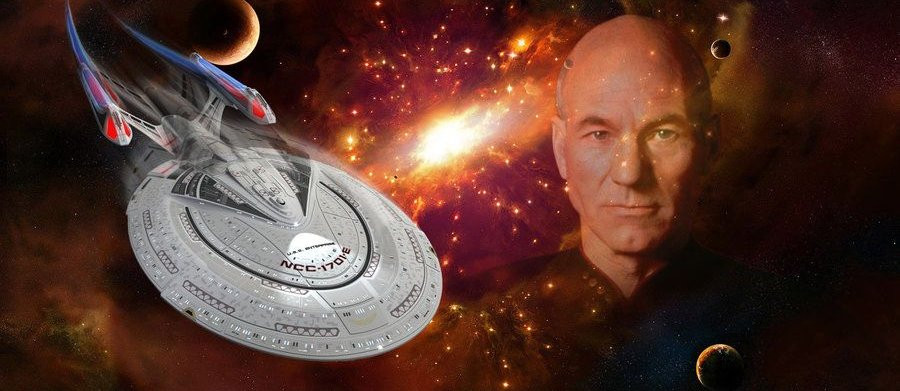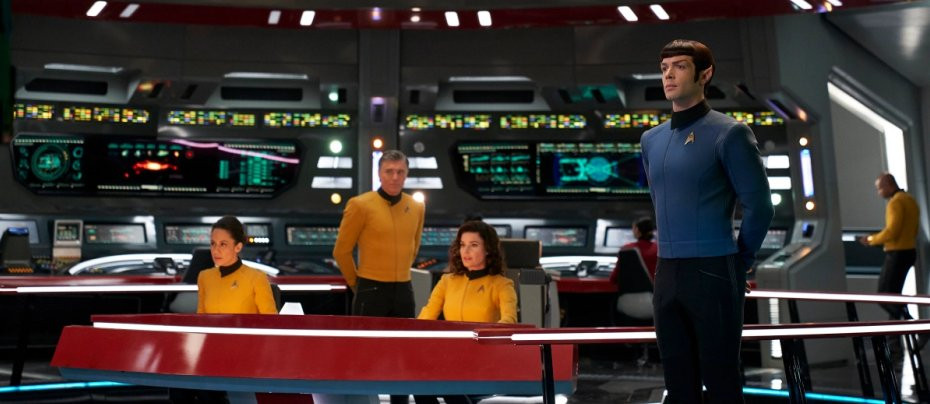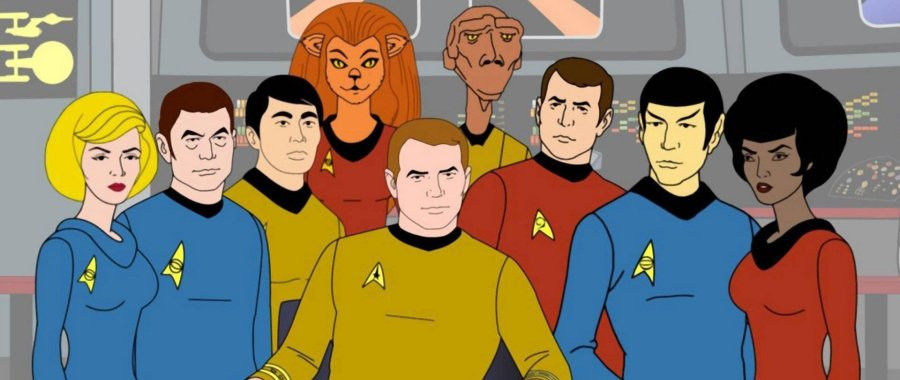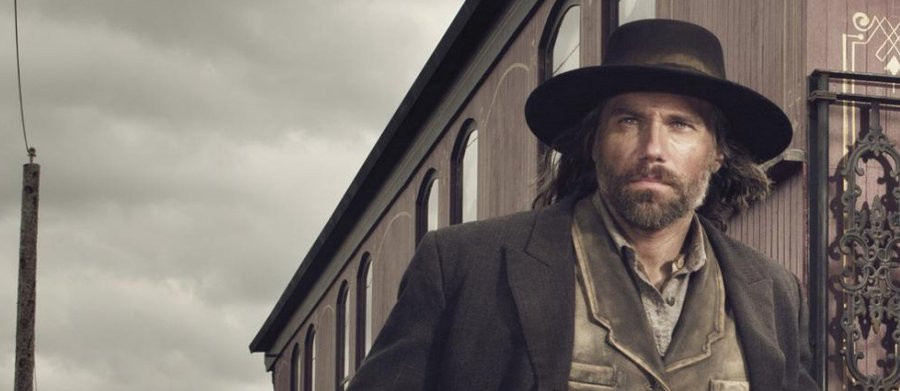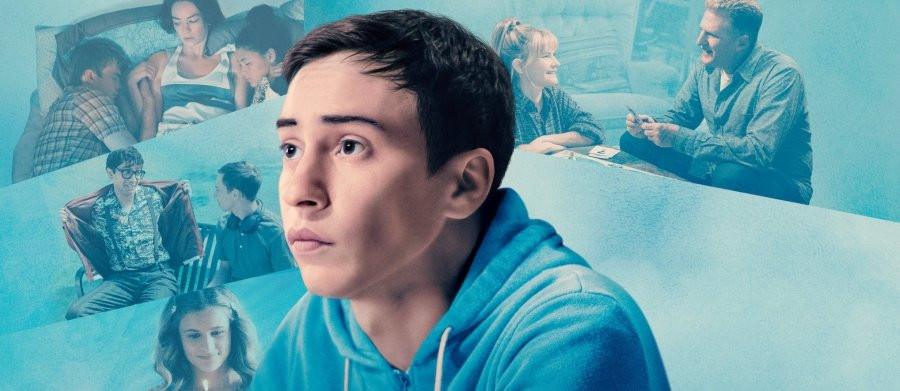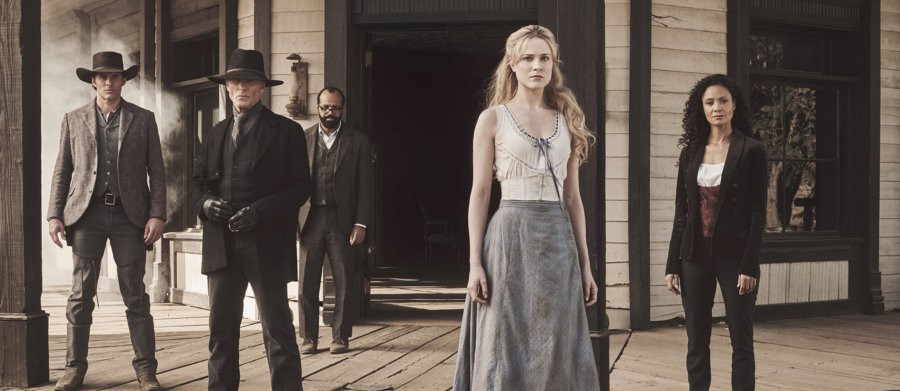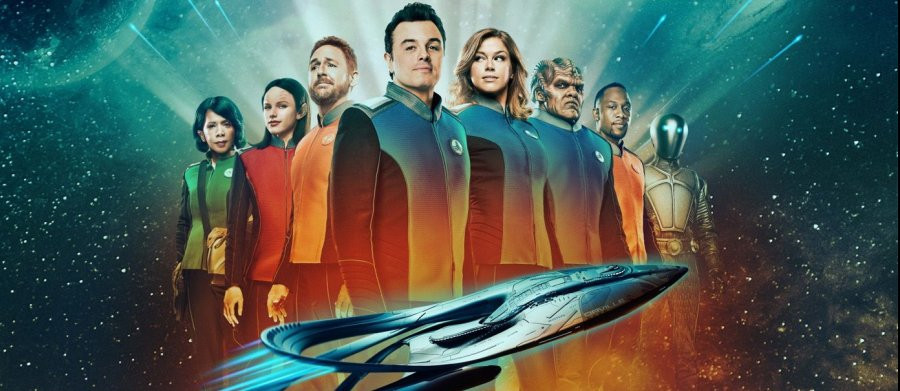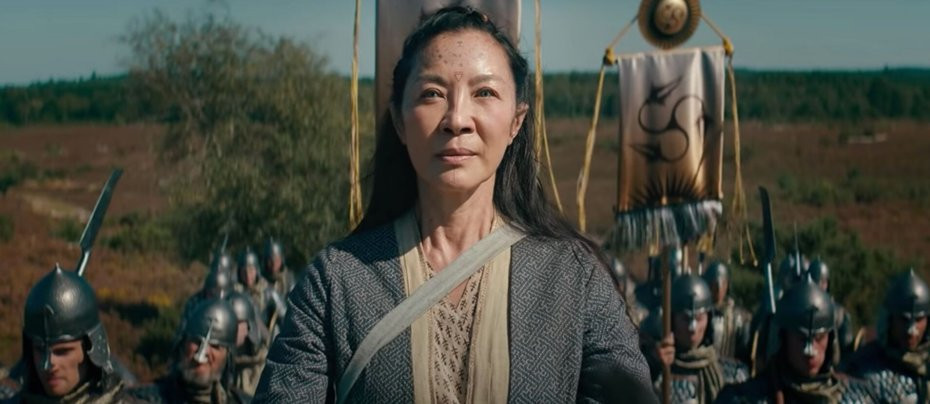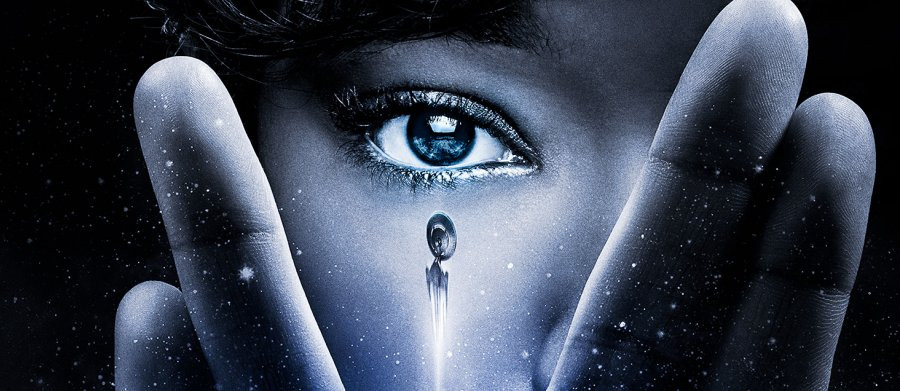
Star Trek: Discovery
2017 - United StatesAll five seasons reviewed by Daniel Tessier
Following the cancellation of Star Trek: Enterprise in 2005, the Star Trek franchise was adrift. After over seven hundred episodes and ten films, Star Trek had become predictable, a genre into itself, and while its core fanbase was dedicated, it had been losing mainstream appeal for years. This changed in 2009, when J.J. Abrams released his reboot movie, titled simply Star Trek, to major popular and critical success. The film gave the Trek franchise a much-needed kick up the warp core, reinventing it for the 21st century.
With two more films released over the next few years, the newfound success of Star Trek on the big screen made it inevitable that it would return to its original home on television. Hot on the heels of the original Star Trek's fiftieth anniversary, Star Trek: Discovery made its debut in 2017 on the online streaming service CBS All Access, becoming a headline show for the site in the same way Star Trek: Voyager had headlined its own network in the nineties. Purchased by Netflix for worldwide distribution, Discovery was designed as a version of Star Trek for the binge-watching generation. Serialised storytelling that encourages long watching sessions sets Discovery apart from earlier iterations of the franchise which were more episodic in nature, although Discovery's episodes were still released weekly.
The original concept for the series was an anthology format, inspired by American Horror Story, which began a new setting with new characters each season. Bryan Singer, who had previously worked on both Voyager and Deep Space Nine, was chosen as showrunner with an idea for each season to take place at a different point in Trek's future history. In the event, this idea was dropped, but its influence can be felt on how Discovery has evolved and the subsequent array of new Trek series. Alex Kurtzmann, one half of the writing team for 2009's Star Trek and its sequel Star Trek Into Darkness, was brought on to create the series concept with Fuller, with Nicholas Meyer (writer and director of the hugely popular Star Trek II: The Wrath of Khan and Star Trek VI: The Undiscovered Country) recruited as a consulting producer. The new series was starting with a creative team of excellent pedigree.
In time, Fuller would leave the series to focus on his work on American Gods, but his influence on the series' direction would be felt by the further writers brought on as co-showrunners, Aaron Harberts and Gretchen Berg, and executive producer Akiva Goldsman. It was decided that the new series would be another prequel to the original series, an approach that had worked well for the reboot movies. The first season of Discovery is set a century after Enterprise and ten years before the original Star Trek, an era that had previously been almost unseen on screen. As such, it was a prime opportunity to both riff on established continuity and set up new and interesting storylines.
The name Discovery is one that fits particularly well with Trek, of course. The primary starship of the series, the USS Discovery, shares its name with the third NASA Space Shuttle, the Discovery OV-103, as well as the spacecraft from the groundbreaking film 2001: A Space Odyssey, the USSC Discovery One. The Starship Discovery's registration, NCC-1031 has a fun significance – it's the date of Hallowe'en in American format, Fuller's favourite holiday.
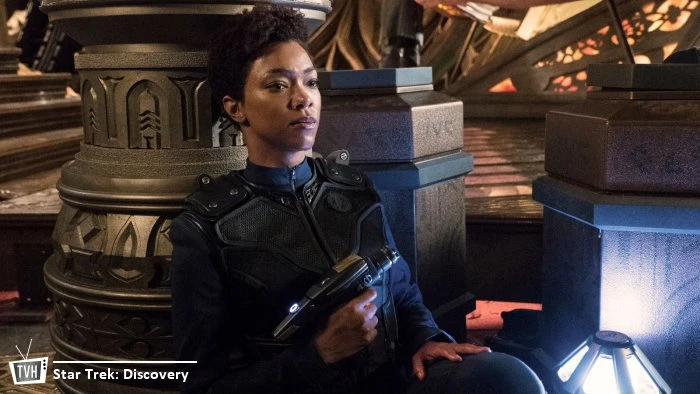
Very much setting it apart from previous series is its lead character. While Trek has always followed an ensemble format, each series and film was chiefly centred around the commanding officer. Discovery is different, focusing on Michael Burnham, a young woman with an unusual background. Played by Sonequa Martin-Green, Burnham happens to be the adopted sister of Spock, a character who had never previously been hinted at. Burnham grew up with scientist parents who were killed by Klingon raiders, giving her a long-standing mistrust of the warlike aliens. Taken in by Sarek, the Vulcan Ambassador, she grew up on the planet Vulcan alongside Spock, learning a more Vulcan way of life than probably any human before her. Martin-Green gives a remarkable performance as Burnham, possessing a poise and restraint unusual for even Trek's human characters, but hinting at great passion and will beneath. She imbues the character with a great deal of charm, and it's not difficult to see why she was chosen to headline the series.
At the beginning of the series, in its two-part opening story, Burnham is the first officer on the USS Shenzhou under Captain Philippa Georgiou. Finding themselves in a confrontation with a huge Klingon ship, Burnham decides the best course of action is to fire on the Klingons first – a "Vulcan hello," as she calls it, referring to the Vulcans' own first contact with the Klingons where they only gained their respect by engaging them in battle. Turning against her captain and mentor, Burnham seizes control of the ship, firing on the Klingons and leading to the near destruction and total abandonment of the Shenzhou.
Burnham is utterly lost, and is charged with mutiny, stripped of her rank and sentenced to life in prison. She's also blamed for starting a new war with the Klingon Empire – undeservedly, as the Klingon faction encountered was planning to attack the Federation in any case – and is left a pariah. She is later taken onto Discovery's crew in a limited capacity as a specialist. Over the course of five seasons, Burnham makes peace with her mistakes and regained the trust of Starfleet, once again becoming First Officer and finally captain of the Discovery.
In an impressive bit of casting, Captain Georgiou is played by film star Michelle Yeoh, who plays the captain as a reserved and refined figure. It's all the more shocking then when the series kills off its big star in the opening story. However, this being Star Trek, her death isn't the end for the character. In the second half of the first season, Discovery is thrown into the so-called Mirror Universe – the brutal alternative reality seen occasionally in The Original Series, Deep Space Nine and Enterprise – where Georgiou's counterpart is Emperor. She makes the unlikely journey back with the crew to the main universe, where she becomes a dangerous but useful operative for Starfleet.
The first season deals with the devastating war with the Klingons. The USS Discovery and its crew aren't introduced until the third episode. In another impressive big name casting coup, Captain Gabriel Lorca is played by Jason Isaacs, giving him a broad southern American accent for reasons best known to himself. Isaacs is a huge fan of the original Star Trek and was initially reluctant to take place in a spin-off series fearing it would be a poor competitor, eventually being talked round by the strength of the character writing.

The remaining crew is a strange mixture of characters. Doug Jones, the noted creature actor seen behind layers of make-up and latex in Pan's Labyrinth, Hellboy and The Strain, plays Commander Saru. While the towering, skeletal Jones could probably pass for an alien anyway, he is once more encased in prosthetics to play a Kelpien, a member of a prey race from a planet of devastating predators. Perpetually in a state of fear, Saru's alien viewpoint provides the same kind of outsider role as Spock, Data or Seven of Nine, but often pits him against his more aggressive human crewmates. Jones gives an excellent performance, imbuing Saru with an uncanny locomotion and poise. He and Burnham share a confrontational past from the Shenzhou, and this makes her time on Discovery even harder. Over time, Burnham and Saru come to terms with their differences and grow to become firm friends. Saru experiences even more growth than Burnham, evolving beyond his prey animal beginnings and even revolutionising his entire people's way of life.
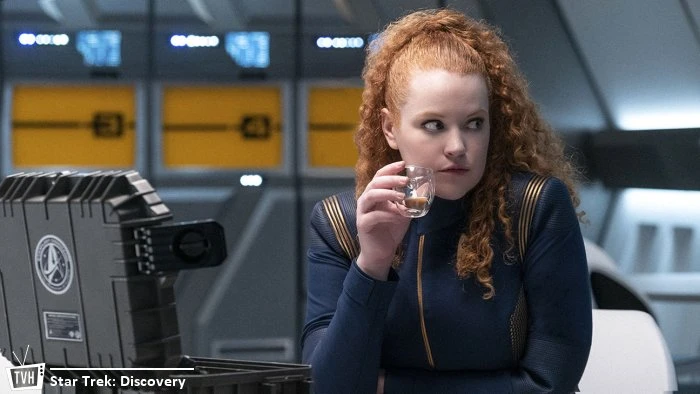
Mary Wiseman plays Cadet Sylvia Tilly, an enthusiastic and sometimes hard-to-handle young officer who's determined to make the best of herself. Actor and singer Anthony Rapp plays Dr. Paul Stamets, an astromycologist of all things (that's a space fungus expert). While this might not seem terribly essential, Discovery is equipped with an experimental "spore drive" which allows it to travel vast distances rapidly through a cosmic web of mycelium, which might be the most out-there idea Trek has done in a while. His husband, Dr Hugh Culber (Wilson Cruz) is a senior medical officer on the ship, and the contrast between the highly intelligent but often difficult Stamets and the good-natured Culber makes for an interesting dynamic.
British actor Shazad Latif has a dual role as Ash Tyler, a security officer who is recruited onto the ship by Lorca when they meet in a Klingon prison, and Voq, a Klingon agent. Originally Voq was listed on the cast under a false name, in order to disguise the plot twist that the two characters were one and the same. Tyler is a character torn apart by his true nature and his imprinted personality, but also a noble man who strikes up an uneasy romance with Burnham.
The main cast of Discovery embraces diversity like no other iteration of the franchise. While ever since the original series Star Trek was noted for its diversity of cast, over the years it had fallen behind the times and had become perhaps one of the less diverse prime time dramas by the time of Enterprise. Discovery's cast includes the first African-American female lead for a Trek series, its first openly gay characters (who are also played by gay actors), and actors of various ethnicities both as regular, recurring and supporting characters. Dishearteningly, but predictably, many supposed fans of franchise were furious about this deliberate move for inclusivity, which makes you wonder whether they understood the franchise at all.
Being set in the lead up to the original series allowed the showrunners to include a number of elements of classic episodes, something which is both a blessing and a curse. To make the series look like the originals would be impossible, since the technology of the original Enterprise looks hopelessly archaic even by our own 21st century standards. Discovery redesigns almost everything from the starships to the uniforms, while keeping certain props and equipment as visual callbacks to the original. Classic characters are reimagined, with notable actors such as James Frain and Rainn Wilson as Ambassador Sarek and notorious criminal Harry Mudd respectively. From a continuity point-of-view, a prequel is a tricky beast, becoming either hopelessly predictable or clashing with established facts. The visual differences, combined with retcons such as Spock's sister, the devastating Klingon war and the miraculous spore drive upset a number of fans. For a broader audience, however, they remain true to essentials of the original Star Trek, albeit a darker, more cynical interpretation.

Perhaps the most spoken about issue for fans is the revamped Klingons, who were redesigned at Fuller's request to become more alien than ever before. With heavy prosthetics, allegedly monstrous anatomy and bald, elongated skulls, they appear very different to the Klingons familiar to viewers of Star Trek: The Next Generation and its spin-offs. Yet, those Klingons looked wholly different to the very human-like ones seen in the original series. Indeed, the Klingons have varied in appearance so much over the years that there's really no single way for a Klingon to be. For casual viewers the new Klingons simply look like a cool alien race, although the decision to kick off the series with an extended scene of them speaking in their incomprehensible language, complete with lengthy subtitles, was probably too alienating for many. This is a shame, since many of the actors behind the Klingons give excellent performances, especially the recurring actor Mary Chieffo as the noble and complex L'Rell.
After some disruption behind the scenes caused delays, the second season of Discovery was released beginning in January 2019. The unrest on the creative front led to a different direction for the second season, with fan concerns about how Discovery fit with the rest of the franchise clearly influencing the storyline. Season two is a more upbeat affair, albeit still not as proudly optimistic as The Original Series and delves into the background of the original Star Trek with gusto.
The majority of the characters returned from the first season, even some of those who hadn't quite survived that story (sci-fi is like that). Joining the roster are reimagined versions of familiar Trek characters. Spock, once he turns up, is played by Ethan Peck – grandson of the legendary Gregory Peck – a very talented young actor who brings new dimensions to the beloved character. His deteriorating mental health, complex relationship with his father and sister, and his disillusionment with Starfleet make a deep character even more complex. Anson Mount takes on the role of Captain Christopher Pike – the original Star Trek captain from the first pilot episode – who leaves the Enterprise for a time to command Discovery. Also joining in a recurring capacity is actor and comedian Tig Notaro as the acerbic engineer Jet Reno, who rapidly sets herself up as a fan favourite.
Season two of Discovery manages to balance the high stakes, deadly threats of the first season with a fair bit more fun and optimism. Nonetheless, the series remains a bleaker vision of the future than Trek is best known for. Still, in today's world, where a bright future looks less likely than ever, showing that such a future must be fought for is worthwhile. Discovery's second season ends with a clear decision to divorce it from its tricky position as a prequel.
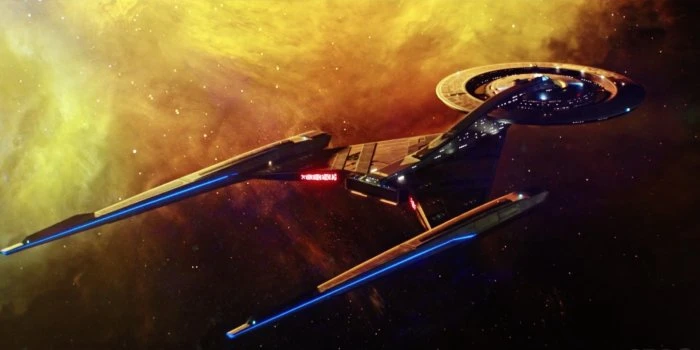
Season three takes us far beyond the era before explored by Star Trek. Yes, we've seen the occasional glimpse of the future beyond the 22nd to 24th centuries that make up the main setting of the franchise, but the further future is largely an untold mystery. Season three of Discovery goes well beyond this, with Burnham blasting through time to the turbulent 32nd century. It truly is a strange new world for her, with old certainties removed and new mysteries to explore. Finally, Star Trek: Discovery had moved beyond the familiar and into a whole new universe that it could map out.
That's not to say that the third season moves into completely uncharted territory. There are far more familiar races and planets than there are new ones, but these have naturally moved on in new and surprising ways over the intervening nine hundred years. In some ways, this seems a missed opportunity, as although there are new worlds to explore, the season spends a great deal of time on recognisable ones. On the other hand, there seems little point travelling further into the future if not to see how the march of history has affected the world we know. This new period is one of strife, existing in the aftermath of the Burn: a cataclysmic event that occurred 120 years earlier, detonating almost all of the galaxy's dilithium, the material essential to the warp drive. Millions of lives were lost, and warp travel suddenly became almost untenably expensive.
Against this background, history has moved on in unexpected ways. Incredibly sophisticated technology exists alongside grubby hands-on machinery, criminals wield as much power as governments and Starfleet is a much-maligned, ineffectual organisation. What's left of the fleet is trying desperately to keep the drastically diminished Federation together, after Earth and even Vulcan have left.
Discovery's status as the most diverse Star Trek ever is even more deserved this season, with a remarkable mix of genders, sexualities and ethnicities making up the cast. British actor David Ajala joins as the mysterious Cleveland Booker, an empathic alien living as a rogueish courier. Book becomes a central character of the series, forming a tumultuous but deep relationship with Burnham. Blue del Barrio joins the main cast as the young Ensign Adira Tal, with Ian Alexander recurring as Gray Tal. The non-binary and trans-masc actors take on a complex storyline about relationships and identity involving the Trill, an alien race that live many lives, long considered a trans allegory since their exploration on Deep Space Nine.
Season Three is one the strongest of a series finding its feet. However, Season Four took a downturn, suffering from two problems that have plagued recent Trek series. One is, shall we say, “apocalypse exhaustion,” with each year providing yet another civilisation-ending threat that must be defeated. Both the previous seasons of Discovery and the three seasons of Star Trek: Picard involved huge, galaxy-wide threats. Constantly upping the stakes ends up making everything seem, strangely, less dramatic rather than more. Sometimes it's nice to let the cataclysms lie and just deal with smaller scale problems, but Season Four saw yet another inexplicable and devastating force threatening the galaxy.
The other problem is the pacing, which is even more unsteady in this season than before. While there are some episodes that mostly standalone, Season Four heavily serialised. A great deal of time is spent on exploring how the individual characters deal with the impending disaster, and how it affects their relationships. Major plot events, particularly at the end of the season, are left terribly rushed, giving the whole a disjointed feel.
It's a real pity, because somewhere in here is potentially the best season of Star Trek in years, dealing with hope in the face of adversity, truly alien aliens and reaffirming the franchise's core themes of exploration and communication. Trek has never looked better, with both planetary and stellar vistas that absolutely take your breath away, while on the dramatic front the cast are giving it their all with some of their best performances.
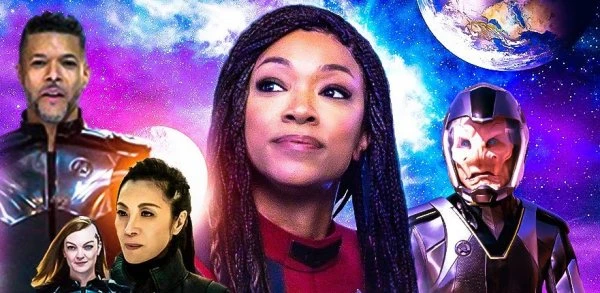
The fifth and final season arrived in 2024. At only ten episodes it's shorter than previous runs, yet this is in its favour. With less time to spend on superfluous material, it's tighter and more consistently paced. It also has a simple, uncomplicated structure, provided by a straightforward but effective central concept. Centuries earlier, six scientists found the incredibly advanced technology of the Progenitors, the very first humanoid species in the galaxy, who had seeded the other planets billions of years ago. Fearing the tech was too dangerous to be used until the galaxy's peoples had grown up, the scientists hid it, leaving a series of clues on a treasure hunt across the galaxy.
The season follows a simple quest narrative, with the first two episodes setting it up; an episode for each clue, set in a different location; and finally, two episodes to tie everything up. It's a storyline with high stakes without being about the impending end of everything, embracing both exploration and a look back at the long history of the Trek franchise. In its final year, Discovery finally fit together.
Joining the cast for the last hurrah are Battlestar Galactica's Callum Keith Rennie as Rayner, a disgraced captain who is busted down to First Officer, serving under the much younger Captain Burnham. On the opposite side we have a sympathetic villain duo, the sultry and aggressive Moll (Eve Harlow) and the mysterious alien L'ak (Elias Toufexis). This season embraces the past of the franchise just like before, but balances it with the ongoing storyline more delicately. As well as the Progenitors and their secrets calling back to a well-regarded episode of The Next Generation, the main enemy later in the season is the Breen. This deadly but scarcely seen alien race, hidden behind all-encompassing isolation suits, were previously a late-in-the-day threat on Deep Space Nine, and they similarly appear out of nowhere here, also after the ancient tech.
Season Five was not originally intended as the final run, but news of cancellation came in time for an extended epilogue to be filmed for the final episode, giving us a glimpse even further into the future of Burnham and the galaxy. As for our future, Discovery has spawned several spin-offs. Star Trek: Strange New Worlds, starring Mount and Peck as Pike and Spock onboard the Enterprise is a hit and already filming its third season. In post-production is a TV movie, Star Trek: Section 31, starring Michelle Yeoh as Georgiou; and entering production is Star Trek: Starfleet Academy. An Academy-set series has been suggested often, and this will follow on from Discovery in its distant future, with Mary Wiseman all but confirmed to be returning as Tilly in her new role as teacher.
Star Trek: Discovery has been a controversial and uneven series from start to finish. While it hasn't always been what the fans wanted, it's inarguable that it has successfully relaunched the franchise on television, paving the way not only for its direct spin-offs, but the other newer Trek series, Star Trek: Picard, Star Trek: Lower Decks and Star Trek: Prodigy, each taking a completely different approach to continuing the story. The adventure continues...
Seen this show? How do you rate it?
Seen this show? How do you rate it?
Published on June 15th, 2024. Written by Daniel Tessier for Television Heaven.


